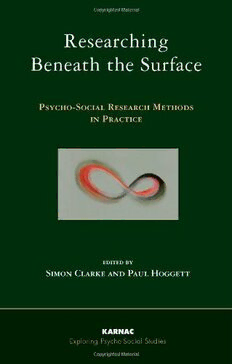
Researching Beneath the Surface: Psycho-social Research Methods in Practice (Explorations in Psycho-Social Studies) PDF
289 Pages·2009·1.422 MB·English
Most books are stored in the elastic cloud where traffic is expensive. For this reason, we have a limit on daily download.
Preview Researching Beneath the Surface: Psycho-social Research Methods in Practice (Explorations in Psycho-Social Studies)
Description:
Since the 1990s, the social sciences have begun to change. Traditional models of human rationality which opposed reason to passion are being challenged. The familiar split between individual and society, psychology and sociology, is now recognized as unhelpful to the study of both. And, as ways have been sought to overcome such splits, psychoanalysis has increasingly appeared in the breach. Drawing also on some aspects of discourse psychology, continental philosophy and anthropological and neuro-scientific understandings of the emotions, psycho-social studies has emerged as an embryonic new paradigm in the human sciences in the UK. Psycho-social studies uses psychoanalytic concepts and principles to illuminate core issues within the social sciences. Psycho-social studies is also informing the development of new methodologies in the social sciences including the use of free association and biographical interview methods, the application of infant observation methodologies to social observation, the development of psychoanalytic ethnography/fieldwork and attention to transference/countertransference dynamics in the research process.This book examines some of these methodological developments and draws upon the experiences of a group of researchers and doctoral students based around the Centre for Psycho-Social Studies at the University of the West of England.
See more
The list of books you might like
Most books are stored in the elastic cloud where traffic is expensive. For this reason, we have a limit on daily download.
